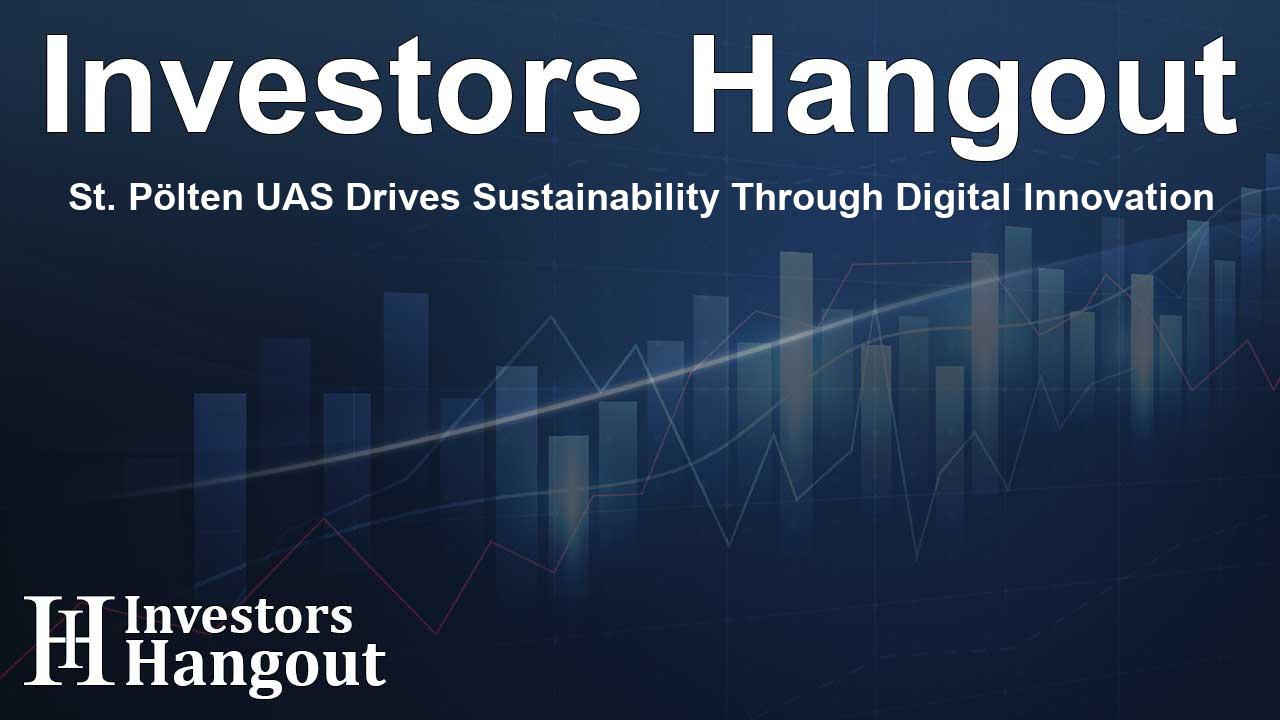St. Pölten UAS Drives Sustainability Through Digital Innovation

Advancing Sustainability with Digital Product Passports
In today's world, sustainability has become imperative, and institutions like St. Pölten University of Applied Sciences are at the forefront of this vital movement. Through innovative projects centered around digital product passports, they are exploring how to promote sustainability across various industries, notably plastics, electronics, and food supply chains.
The Role of Digital Product Passports
Digital product passports serve as a comprehensive data hub essential for a sustainable circular economy. By enabling tracking of products throughout their life cycles, these passports enhance product safety, streamline production processes, and significantly mitigate environmental impacts.
Understanding the Importance of Environmental Data
According to Tassilo Pellegrini, Co-Head of the Institute for Innovation Systems at St. Pölten UAS, managing environmental data effectively is crucial for establishing a circular economy. This includes detailed information on raw materials, product composition, and manufacturing processes.
Innovative Projects Focused on Sustainable Practices
Several projects are under exploration at St. Pölten UAS, each targeting a specific aspect of sustainability:
Promoting Sustainable Practices in Electronics
One notable initiative is ECO-TCO, which investigates how data from digital product passports can support the creation of eco-friendly electronic products. Pellegrini leads this project, focusing on how digital data can help compare lifecycle costs among different product versions to promote sustainable choices.
Enhancing Plastics Recycling
The DPP4PLASTICS project addresses the challenges of integrating digital product passports within the plastics sector. This study highlights the necessity for companies in this field to have accurate information regarding synthetic materials for improved recycling processes. By ensuring high-quality recycled plastics, the industry can reduce reliance on virgin materials.
Exploring the Food Supply Chain
St. Pölten UAS is also pioneering efforts on a digital product passport specifically for food supply chains, particularly focusing on soybeans. This project seeks to build a prototype that enhances traceability and improves sustainability in food production.
The Challenges Ahead
Implementing digital product passports isn't without obstacles. Alexandra Anderluh, a project manager at the Carl Ritter von Ghega Institute for Integrated Mobility Research, emphasizes the complexities of supply chains and the need for seamless communication among different technologies and organizations.
Collaboration and Funding for Research Projects
These innovative projects receive support from various funding bodies. For instance, the ECO-TCO project is backed by the FFG through its "Digital Technologies 2023" program, with partnerships including Siemens AG Austria and a prominent law firm.
Study DPP4PLASTICS
This initiative is also funded by the FFG and collaborates with the Transfercenter für Kunststofftechnik GmbH and the same law firm, aiming to research the implications of digital product passports for the plastics industry.
DPP4FOOD: Enhancing the Food Sector
In the food industry, the DPP4FOOD project focuses on the development of a digital product passport that caters specifically to food supply chains. This research is supported by various partners and funding, aiming to establish more sustainable practices within this crucial sector.
Past Research With DPP4ALL
St. Pölten UAS previously conducted the DPP4ALL project that examined the technical and organizational requirements essential for a successful digital product passport implementation. Funded by the Federal Ministry for Climate Action, this initiative laid foundational knowledge for current projects.
Contact Information for Further Inquiries
For those interested in learning more about these projects or St. Pölten University of Applied Sciences, additional details can be found through their official website. They can be reached at:
Contact
Mag. Mark Hammer
Section Head Press
Marketing and Communications
T: +43 (2742) 313 228 269
M: +43 (676) 847 228 269
St. Pölten University of Applied Sciences
Campus-Platz 1
3100 St. Pölten
T: +43 (2742) 313 228
Frequently Asked Questions
What are digital product passports?
Digital product passports are data-based tools that provide comprehensive information about a product’s life cycle, promoting transparency and sustainability.
How does St. Pölten UAS contribute to sustainability?
St. Pölten UAS leads various innovative projects that implement digital product passports, enhancing sustainability practices across the plastics, electronics, and food industries.
What is the ECO-TCO project about?
ECO-TCO explores the use of digital product passports to promote sustainable electronic products and assess their lifecycle costs.
Who is involved in these sustainability projects?
Different stakeholders, including industry partners like Siemens AG, law firms, and various research entities collaborate on these sustainability projects.
What challenges exist in implementing digital product passports?
Challenges include the complexity of supply chains and ensuring effective communication between various technologies and organizations required for their implementation.
About Investors Hangout
Investors Hangout is a leading online stock forum for financial discussion and learning, offering a wide range of free tools and resources. It draws in traders of all levels, who exchange market knowledge, investigate trading tactics, and keep an eye on industry developments in real time. Featuring financial articles, stock message boards, quotes, charts, company profiles, and live news updates. Through cooperative learning and a wealth of informational resources, it helps users from novices creating their first portfolios to experts honing their techniques. Join Investors Hangout today: https://investorshangout.com/
Disclaimer: The content of this article is solely for general informational purposes only; it does not represent legal, financial, or investment advice. Investors Hangout does not offer financial advice; the author is not a licensed financial advisor. Consult a qualified advisor before making any financial or investment decisions based on this article. The author's interpretation of publicly available data shapes the opinions presented here; as a result, they should not be taken as advice to purchase, sell, or hold any securities mentioned or any other investments. The author does not guarantee the accuracy, completeness, or timeliness of any material, providing it "as is." Information and market conditions may change; past performance is not indicative of future outcomes. If any of the material offered here is inaccurate, please contact us for corrections.